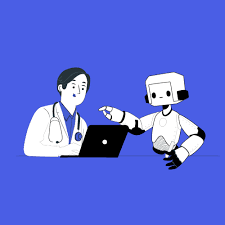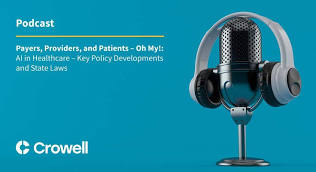The Transformative Role of AI in Healthcare
Artificial Intelligence (AI) is revolutionizing the healthcare industry, offering unprecedented opportunities to enhance patient care, streamline operations, and drive medical research. As AI technologies continue to evolve, their integration into healthcare systems has become increasingly vital.
Enhancing Diagnostic Accuracy
One of the most promising applications of AI in healthcare is its ability to improve diagnostic accuracy. Machine learning algorithms can analyze vast amounts of medical data, including imaging scans and lab results, with a level of precision that often surpasses human capabilities. For instance, AI-powered tools have shown remarkable success in early detection of diseases such as cancer and diabetic retinopathy by identifying patterns that might be missed by the human eye.
Personalized Medicine
AI is also paving the way for personalized medicine. By analyzing genetic information alongside clinical data, AI systems can help tailor treatments to individual patients based on their unique genetic makeup and health history. This approach not only improves treatment efficacy but also minimizes potential side effects, leading to better patient outcomes.
Streamlining Administrative Tasks
The administrative burden in healthcare settings can be overwhelming. AI solutions are being used to automate routine tasks such as scheduling appointments, managing patient records, and processing insurance claims. This automation frees up valuable time for healthcare professionals, allowing them to focus more on patient care rather than paperwork.
Accelerating Drug Discovery
The drug discovery process is notoriously time-consuming and expensive. AI is helping to accelerate this process by analyzing biological data and predicting how different compounds will interact with target proteins in the body. This capability significantly reduces the time it takes to bring new drugs from the lab to market while also lowering costs.
Challenges and Ethical Considerations
Despite its potential benefits, the integration of AI in healthcare poses several challenges. Data privacy concerns are paramount as sensitive patient information is handled by AI systems. Additionally, there are ethical considerations regarding decision-making processes when machines are involved in clinical settings.
Ensuring that AI systems are transparent and that their decisions can be explained is crucial for maintaining trust between patients and healthcare providers. Moreover, continuous monitoring and validation of AI algorithms are necessary to ensure they remain accurate and unbiased over time.
The Future of AI in Healthcare
The future holds immense promise for AI in healthcare as technology continues to advance. Ongoing research aims at integrating more sophisticated machine learning models with real-world clinical environments. As these technologies mature, they will likely play an even greater role in transforming how healthcare is delivered globally.
In conclusion, while challenges remain on the path toward widespread adoption of AI in healthcare, its potential benefits make it an essential component of modern medicine’s evolution. By harnessing the power of artificial intelligence responsibly and ethically, we can look forward to a future where healthcare is more efficient, effective, and accessible for all.
9 Essential Tips for Implementing AI in Healthcare: Ensuring Safety, Effectiveness, and Trust
- Ensure data privacy and security measures are in place to protect patient information.
- Regularly update AI algorithms to ensure accuracy and effectiveness in diagnosing medical conditions.
- Collaborate with healthcare professionals to integrate AI technology into existing medical practices.
- Train healthcare staff on how to use AI tools effectively for better patient care.
- Monitor and evaluate the performance of AI systems to identify areas for improvement.
- Comply with regulatory guidelines and ethical standards when developing and deploying AI solutions in healthcare.
- Focus on transparency and explainability of AI decision-making processes to build trust among patients and clinicians.
- Use AI for predictive analytics to identify potential health risks in patients before they escalate.
- Invest in research and development to advance the capabilities of AI technology in improving healthcare outcomes.
Ensure data privacy and security measures are in place to protect patient information.
In the realm of AI in healthcare, ensuring data privacy and security is paramount to protect sensitive patient information. As AI systems increasingly handle vast amounts of personal health data, robust measures must be implemented to safeguard this information from breaches and unauthorized access. This includes employing advanced encryption techniques, regularly updating security protocols, and adhering to strict regulatory standards such as HIPAA. By prioritizing data privacy and security, healthcare providers can maintain patient trust and ensure that the benefits of AI technologies are realized without compromising individual confidentiality.
Regularly update AI algorithms to ensure accuracy and effectiveness in diagnosing medical conditions.
Regularly updating AI algorithms is crucial to maintaining their accuracy and effectiveness in diagnosing medical conditions. As medical knowledge expands and new data becomes available, AI systems must evolve to incorporate the latest findings and trends. This continuous updating process helps ensure that the algorithms remain relevant and capable of identifying subtle patterns in patient data that may indicate emerging health issues. By keeping AI models current, healthcare providers can enhance diagnostic precision, reduce the likelihood of errors, and improve patient outcomes. Additionally, regular updates help mitigate biases that may have been present in older datasets, leading to more equitable healthcare solutions for diverse populations.
Collaborate with healthcare professionals to integrate AI technology into existing medical practices.
Integrating AI technology into existing medical practices requires close collaboration with healthcare professionals to ensure that the solutions are practical, effective, and aligned with clinical needs. By working together, AI developers can gain valuable insights from medical practitioners about the challenges and nuances of patient care, enabling them to tailor AI tools that enhance rather than disrupt workflows. This collaborative approach ensures that AI systems are user-friendly and seamlessly integrated into daily operations, ultimately improving patient outcomes and increasing efficiency. Additionally, involving healthcare professionals in the development process fosters trust and acceptance of AI technologies among medical staff, paving the way for smoother implementation and adoption across healthcare facilities.
Train healthcare staff on how to use AI tools effectively for better patient care.
Training healthcare staff on the effective use of AI tools is crucial for enhancing patient care and maximizing the potential of these technologies. By equipping medical professionals with the necessary skills and knowledge, they can seamlessly integrate AI into their daily workflows, leading to more accurate diagnoses, personalized treatment plans, and improved patient outcomes. Comprehensive training ensures that healthcare providers understand the capabilities and limitations of AI tools, enabling them to make informed decisions and maintain a high level of trust with patients. Furthermore, ongoing education helps staff stay updated with the latest advancements in AI technology, fostering an environment of continuous improvement and innovation in patient care.
Monitor and evaluate the performance of AI systems to identify areas for improvement.
Monitoring and evaluating the performance of AI systems in healthcare is crucial for identifying areas that require improvement and ensuring optimal outcomes. Regular assessments allow healthcare providers to verify that AI algorithms are functioning as intended, maintaining accuracy, and adapting to new data inputs over time. By continuously analyzing the effectiveness of these systems, potential biases or errors can be detected early, allowing for timely adjustments and enhancements. This proactive approach not only helps in refining AI tools but also builds trust among patients and practitioners by demonstrating a commitment to safety, reliability, and ethical use of technology in medical settings.
Comply with regulatory guidelines and ethical standards when developing and deploying AI solutions in healthcare.
When developing and deploying AI solutions in healthcare, it is crucial to comply with regulatory guidelines and adhere to ethical standards to ensure patient safety and trust. Regulatory bodies, such as the FDA in the United States, provide frameworks that guide the safe implementation of AI technologies, ensuring they meet necessary performance and safety criteria. Adhering to these guidelines helps prevent potential risks associated with AI applications, such as biased algorithms or data privacy breaches. Ethical standards emphasize transparency, accountability, and fairness in AI systems, fostering trust among patients and healthcare providers. By prioritizing compliance and ethics, developers can create AI solutions that not only enhance healthcare delivery but also protect patient rights and well-being.
Focus on transparency and explainability of AI decision-making processes to build trust among patients and clinicians.
In the rapidly evolving field of AI in healthcare, focusing on transparency and explainability of AI decision-making processes is crucial for building trust among patients and clinicians. As AI tools are increasingly used to assist with diagnoses, treatment planning, and patient management, it becomes essential for these systems to provide clear and understandable explanations of their recommendations. Transparency ensures that both healthcare providers and patients can comprehend how decisions are made, which fosters confidence in the technology’s reliability and fairness. By prioritizing explainability, healthcare organizations can bridge the gap between complex algorithms and human understanding, ultimately enhancing collaboration between AI systems and medical professionals while ensuring patient comfort with the use of such advanced technologies.
Use AI for predictive analytics to identify potential health risks in patients before they escalate.
Predictive analytics powered by AI is transforming the way healthcare providers approach patient care by identifying potential health risks before they escalate into serious conditions. By analyzing vast amounts of data from electronic health records, wearable devices, and other sources, AI algorithms can detect subtle patterns and indicators that may suggest an increased risk for diseases such as heart disease, diabetes, or stroke. This proactive approach allows healthcare professionals to intervene earlier, implementing preventive measures or tailored treatment plans that can significantly improve patient outcomes. As a result, predictive analytics not only enhances individual patient care but also contributes to more efficient healthcare systems by reducing the incidence of emergency interventions and hospitalizations.
Invest in research and development to advance the capabilities of AI technology in improving healthcare outcomes.
Investing in research and development is crucial for advancing the capabilities of AI technology in healthcare, as it drives innovation and refinement of tools that can significantly improve patient outcomes. By allocating resources to R&D, healthcare organizations and tech companies can explore new algorithms, enhance data processing techniques, and develop more sophisticated AI models tailored to medical applications. This investment not only accelerates the discovery of novel diagnostic methods and personalized treatment plans but also ensures that AI systems are safe, reliable, and effective. Furthermore, continuous R&D efforts foster collaboration between technologists and healthcare professionals, leading to solutions that are both technologically advanced and clinically relevant. Ultimately, a commitment to research and development in AI paves the way for a future where healthcare is more precise, efficient, and accessible for all patients.



